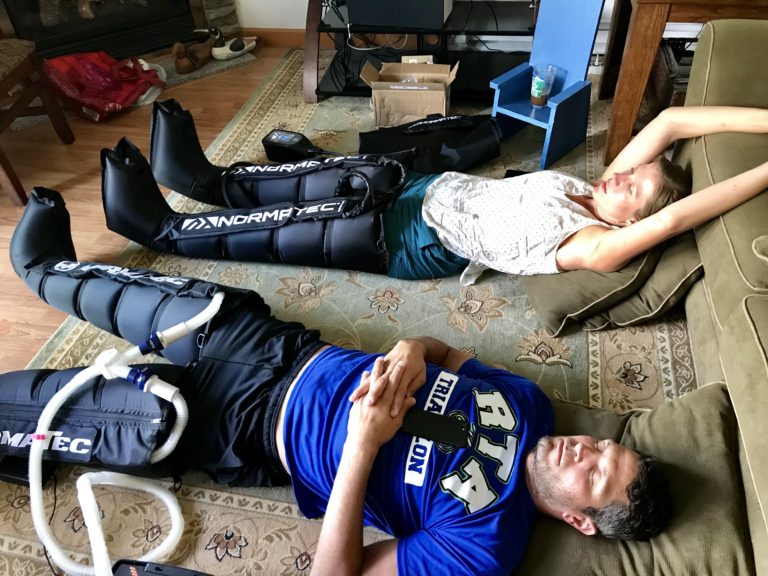|
Stress + Recovery = Fitness Gains When it comes to training for a triathlon (or run race or ANYTHING), stress followed by recovery equals a stronger and fitter athlete. As such, stress needs to be managed throughout training in order to reap results. However, stress is not mutually exclusive to “training stress” and therefore many age group athletes screw this up. MONITOR STRESS Part of a coach’s job is to regularly monitor an athlete’s stress levels. When stress is not managed properly, athletes may plateau or simply not progress as fast as they could otherwise. Worse, poorly managed stress can also lead to injury and in some cases overtraining syndrome or burn out. It’s important to understand you experience all kinds of stress, not just training stress. Common forms of non training stress include: work, family, travel and lack of sleep (which is often a by product of the others). This is important to understand because these outside factors affect recovery and subsequent improvement in triathlon training. HOW WE MANAGE OUR ATHLETE’S STRESS At RTA Triathlon, our coaches use the Training Peaks platform to help monitor each of our athletes stress as it relates to training. Training stress score (TSS), chronic training load (CTL) and training stress balance (TSB) are just a few metrics we use. As you can imagine, this is incredibly insightful and important as it helps our coaches plan future workouts. However, non training related stress less straight forward than the other metrics mentioned above. Yes, you can track sleep and nutrition within Training Peaks – which is helpful, but these metrics/numbers alone won’t paint the entire picture. This is why it’s important for coaches AND athletes to COMMUNICATE REGULARLY. It is also very important for your coach to consider the following when creating your annual training plan and prescribing weekly workouts. *COACH / ATHLETE RESPONSIBILITIES: – Create a realistic plan that works for that individual (their schedule) – Regular communication – Plan revisions as necessary – Accountability to “go to bed,” sleep & recover properly *All of the above are included in RTA coaching programs (LINK) LISTEN TO YOUR BODY It’s important to listen to your body, communicate with your coach if you have one and adjust as necessary. Everyone is going to have good and bad days, but the goal is to reduce the number of bad ones by managing stress as best as possible. Even with the metrics (and others) mentioned above, stress can be subjective. Often it helps to have a third party (coach or training partner), suggest you may be over doing it in some capacity. As athletes, many of us are hard wired to go Go GO. Sometimes, we even think we are invisible – at least I did, until I learned the hard way. MANAGE YOUR STRESS The #1 cure for stress, ANY stress, is SLEEP. Do not cheat your sleep or else you will pay. Far too often we see athletes burning the candle at both ends (i.e. less sleep for more training). This can be a deadly spiral. Because time is your most valuable commodity, part of our job as coaches is to help you maximize it. We do this by making sure each workout has a purpose. It is also the athlete’s responsibility to eliminate wasted time. The biggest culprit of wasted time is typically television. Athletes training for long course events will also need to occasionally consider making sacrifices. Any extra time that is created (by eliminating wasted time) can be allocated to sleep and other forms of active & passive recovery (foam rolling, stretching, massage, NormaTec boots, ect). If sleep is still lacking and your schedule (truly & honestly) is in the best position possible, then lowering your weekly training load is a smart idea. You may be surprised that LESS TRAINING and MORE SLEEP will actually benefit you. This of course depends on a variety of factors including the athlete, their goals and experience level. The moral of the story is stress is stress. If you are stressed and don’t recover properly, you will find yourself in a rut. Whether it’s training related or otherwise, it will affect how well (or not) you execute your workouts and perform on race day. Be honest with yourself and your coach. And remember, you are not a machine ;) Comments are closed.
|
Categories
All
Archives
July 2024
|
RTA TriathlonRTA is a comprehensive triathlon coaching organization and fully supported USAT sanctioned triathlon club.
We are based in Ridgewood, NJ and coach triathletes of all abilities from across the country. Our mission is to make you a better triathlete. Contact us when you're ready to take your "game" to the next level. |
|
|
Quick Links |
Let's get social
RTA Triathlon
Copyright © 2022
Copyright © 2022



 RSS Feed
RSS Feed
